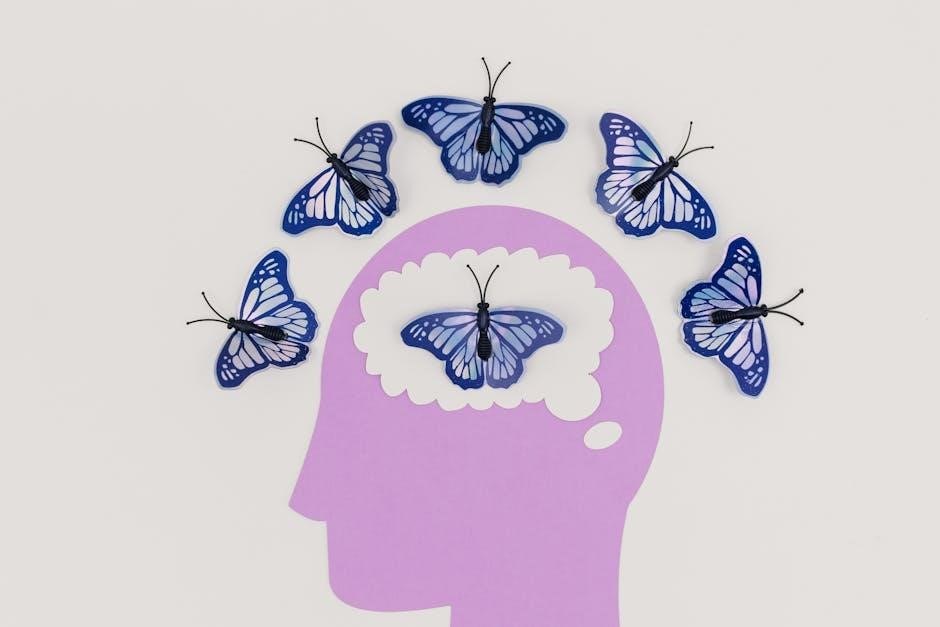The AP Psychology exam assesses understanding of psychological concepts, covering 5 units through 75 multiple-choice questions. It is considered one of the easier AP exams due to its focused content and manageable format.
1.1 Overview of the Exam Format
The AP Psychology exam consists of two main sections: multiple-choice questions and free-response questions. Section I includes 75 multiple-choice questions, covering 5 units of the course, and is completed in 90 minutes. This section accounts for 66.7% of the total exam score. Questions require defining and explaining psychological concepts, as well as applying knowledge to real-world scenarios. The format is designed to test both content understanding and critical thinking skills. Students are advised to manage their time effectively, as the exam is timed and requires careful pacing to answer all questions.
1.2 Importance of Multiple Choice Questions
Multiple-choice questions (MCQs) are a crucial component of the AP Psychology exam, making up 75 questions and accounting for 66.7% of the total score. These questions assess a student’s ability to define and explain psychological concepts, apply theories to scenarios, and demonstrate critical thinking. Unlike free-response questions, MCQs provide a structured format, allowing for objective scoring and clear assessment of knowledge. They also test the ability to eliminate incorrect answers and choose the best option, a valuable skill for standardized testing. Proper preparation and practice with MCQs are essential for success.

Exam Structure and Format
The AP Psychology exam consists of two sections: Section I with 75 multiple-choice questions in 90 minutes, and Section II with free-response questions.
2.1 Section I: Multiple Choice Questions
Section I of the AP Psychology exam includes 75 multiple-choice questions, lasting 90 minutes. These questions test knowledge across five units, requiring students to define, explain, and apply psychological concepts. Topics span research methods, biological bases, sensation, perception, learning, cognition, motivation, and developmental psychology. Students are encouraged to answer every question, as there is no penalty for guessing. If time runs out, selecting answers strategically, such as choosing B, C, or D, can be beneficial. This section evaluates understanding and analytical skills, crucial for exam success.
2.2 Time Allocation and Scoring System
The AP Psychology exam allocates 90 minutes for 75 multiple-choice questions in Section I. Each question is worth 1 point, with no deductions for incorrect answers. Time management is crucial; students should spend about 1 minute per question. The raw score (0–75) is scaled to a 1–5 grade. Scoring emphasizes accuracy and breadth of knowledge. Effective time allocation ensures all questions are attempted, maximizing potential points. Balancing speed and accuracy is key to achieving a high score.

Content Covered in the Exam
The AP Psychology exam covers psychological concepts, including biological bases of behavior, sensation, perception, learning, cognition, motivation, emotion, and developmental psychology, focusing on multiple-choice questions.
3.1 Research Methods and Biological Bases of Behavior
The AP Psychology exam emphasizes research methods, including experimental, correlational, and observational studies, as well as statistical concepts like validity and reliability. Biological bases of behavior cover the structure and function of the brain, neurotransmitters, hormones, and the nervous system. Topics such as neuroplasticity, the endocrine system, and the role of genetics in behavior are also key. Multiple-choice questions often test understanding of these concepts and their applications to psychological phenomena, requiring careful analysis and recall of scientific principles.
3.2 Sensation, Perception, Learning, and Cognition
This section covers how we process sensory information, perceive the world, and develop knowledge. Sensation involves detecting stimuli, while perception interprets them. Key topics include absolute threshold, Weber’s law, and Gestalt principles. Learning encompasses classical and operant conditioning, with concepts like reinforcement and extinction. Cognition explores memory, language, and problem-solving, including memory models like sensory, short-term, and long-term storage. Understanding these processes is crucial for answering multiple-choice questions effectively.
3.3 Motivation, Emotion, and Developmental Psychology
This section explores the drives behind human behavior and emotional responses. Motivation theories include Maslow’s hierarchy, self-determination, and intrinsic/extrinsic factors. Emotion topics cover Ekman’s universal emotions, the James-Lange theory, and cognitive appraisal. Developmental psychology spans lifespan development, focusing on Piaget’s stages, Erikson’s psychosocial theory, and attachment styles. Understanding these concepts helps in tackling multiple-choice questions about human behavior and development. Key terms include drive-reduction theory, emotional regulation, and developmental milestones. These topics are essential for a comprehensive understanding of psychological processes.

Strategies for Success
Mastering AP Psychology requires a strategic approach. Focus on understanding key concepts, practicing multiple-choice questions, and managing time effectively during the exam. Consistent study habits and active recall techniques enhance retention. Prioritize weak areas identified through practice tests. Stay calm and confident to optimize performance.
4.1 Effective Test-Taking Techniques
To excel on the AP Psychology exam, employ effective test-taking strategies. Skim the question stem and identify key terms to focus your thinking. Eliminate clearly incorrect answers first, increasing the odds of selecting the right choice. Read all options carefully before deciding, as subtle differences can be misleading. Avoid falling for trap answers designed to test common misconceptions. Use the process of elimination systematically and stay calm to maintain clarity. Managing your time wisely ensures you attempt every question, maximizing your score. Mastering these techniques builds confidence and improves performance.
4.2 Time Management Tips for 75 Questions
For the AP Psychology exam, managing time effectively is crucial. Allocate approximately one minute per question, leaving 10-15 minutes for review. Start by skimming all questions to identify easier ones and tackle them first. Skip challenging questions initially to avoid wasting time. Use the buffer period to revisit skipped questions and ensure all answers are bubbled in. Prioritize questions you’re confident about to secure as many points as possible. Maintain steady pacing to cover all sections without rushing or falling behind.
4.3 Answering Strategies for Multiple Choice
To excel in the AP Psychology multiple-choice section, employ strategic answering techniques. Always read the question stem carefully and identify key terms. Eliminate obviously incorrect options first to narrow down choices. Use the process-of-elimination method to increase accuracy. If unsure, make an educated guess rather than leaving it blank. Pay attention to absolute words like “always” or “never,” as these are often incorrect. Trust your first instinct unless you’re certain it’s wrong. This approach maximizes scoring potential and reduces errors.

Key Topics to Focus On
Focus on biological foundations, cognitive psychology, and memory models. Master neuroanatomy, sensation-perception, and learning theories. Understand research methods and statistical concepts for a strong foundation.
5.1 Statistical Concepts and Research Design
Understanding statistical concepts is crucial for the AP Psychology exam. Focus on descriptive statistics, including measures of central tendency and variability. Grasp inferential statistics, such as t-tests, chi-square tests, and correlation. Familiarize yourself with research methods, including experimental, correlational, and observational designs. Know the differences between independent and dependent variables, as well as concepts like sampling bias and validity. Practice interpreting graphs and tables, as these are common in multiple-choice questions. Pay attention to limitations of studies and ethical considerations in research design.
5.2 Biological Foundations and Neuroanatomy
Understanding biological foundations is essential for success on the AP Psychology exam. Focus on brain structures, including the cerebral cortex, limbic system, and brainstem, and their functions. Learn about neurotransmitters like dopamine, serotonin, and acetylcholine, and their roles in behavior. Study the endocrine system, particularly the hypothalamus and pituitary gland, and their influence on hormones. Review neuroplasticity and its implications for recovery and learning. Be familiar with techniques like fMRI and PET scans for studying the brain. This knowledge is critical for answering questions on biological bases of behavior.
5.3 Memory Models and Cognitive Biases
Memory models, such as the three-stage model (sensory, short-term, long-term) and the Atkinson-Shiffrin theory, are crucial for understanding how information is processed. Familiarize yourself with types of memory—sensory, working, explicit, and implicit—and factors influencing retention, like chunking and mnemonics. Cognitive biases, such as confirmation bias, anchoring bias, and availability heuristic, are key concepts. Understand how these biases impact decision-making and judgment. Practice applying these models and biases to real-world scenarios and multiple-choice questions. This section is vital for tackling questions on cognition and mental processes effectively.

Practice Resources and Materials
Utilize official AP Psychology practice exams and study guides for targeted preparation. Explore online platforms offering mock tests, flashcards, and detailed concept explanations to enhance your exam readiness effectively.
6.1 Official Practice Exams and PDFs
The College Board offers official AP Psychology practice exams, including the 2019 exam PDF, which mirrors the actual test format. These resources provide authentic multiple-choice questions, scoring guides, and detailed explanations. The 2019 exam PDF is particularly valuable for understanding recent trends and question patterns. Additionally, released exams and PDFs like the “Course and Exam Description” and “AP Psychology Formula Sheet” are essential for targeted preparation. Use these official materials to familiarize yourself with the exam structure and refine your answering strategies effectively.
6.2 Recommended Study Guides and Books
For the 2019 AP Psychology exam, recommended study guides include the AP Psychology Crash Course and Barron’s AP Psychology. These books provide comprehensive overviews of the curriculum, practice questions, and test-taking strategies. Additionally, AP Psychology: A Study Guide by David G. Myers is highly regarded for its clear explanations of complex concepts. Supplementing these with the official 2019 exam PDF ensures a well-rounded preparation, helping students master both content and multiple-choice question formats effectively.
6.3 Online Platforms for AP Psychology Prep
Online platforms like Khan Academy and Coursera offer free AP Psychology resources, including video lessons and practice exercises. Quizlet provides flashcards and tests for key terms and concepts. AP Psychology Reddit is a community-driven space for discussing strategies and sharing materials. Paid platforms like Chegg and Varsity Tutors offer personalized learning tools and practice exams. These resources complement the 2019 AP Psychology exam PDF, helping students refine their multiple-choice skills and master the curriculum effectively.

Common Mistakes to Avoid
Students often rush through questions, misread stems, or spend too much time on one question, leading to poor time management and missed opportunities.
7.1 Misunderstanding Question Stem and Options
One common mistake is misinterpreting the question stem or answer choices due to haste or fatigue. Test-takers often overlook key terms like “except,” “not,” or “least likely,” leading to incorrect answers. Additionally, students may confuse similar-sounding terms or misread complex scenarios. To avoid this, it’s crucial to read each question carefully, identify the task, and eliminate distractors. Practicing active reading and staying focused can help mitigate these errors. Reviewing past mistakes also highlights patterns in misinterpretation, allowing for targeted improvement.
7.2 Time Mismanagement During the Exam
Time mismanagement is a frequent issue, particularly with 75 multiple-choice questions to answer in 90 minutes. Many students spend too long on challenging questions, leaving insufficient time for easier ones. To avoid this, allocate a set time per question, such as 1-2 minutes, and move forward if stuck. Skipping difficult questions initially and returning later ensures all questions are attempted. Regular practice with timed sections helps build speed and accuracy, reducing exam-day stress. Proper time allocation is key to maximizing scores.
7.3 Overthinking and Second-Guessing Answers
Overthinking and second-guessing answers are common pitfalls that can hinder performance on the AP Psychology Exam; Students often spend too much time debating between options, leading to confusion and wasted time. Research shows that first instincts are often correct, and changing answers may decrease accuracy. Encourage self-trust and decisive answering to avoid overcomplicating questions. Additionally, allocate time for reviewing marked questions to minimize second-guessing. Practicing under timed conditions helps build confidence and reduces the tendency to overthink during the actual exam. Stay focused and decisive to maximize scores.

The 2019 AP Psychology Exam
The 2019 AP Psychology Exam featured 100 multiple-choice questions, testing students’ understanding of psychological concepts and theories. It required strong analytical and critical-thinking skills.
8.1 Changes Introduced in 2019
In 2019, the AP Psychology Exam underwent significant changes to better align with course content and enhance student assessment. The multiple-choice section was refined to focus more on critical thinking and application of concepts rather than rote memorization. Questions were designed to integrate knowledge across units, requiring students to synthesize information. Additionally, the exam introduced more scenario-based questions to evaluate practical understanding. These changes aimed to ensure a deeper comprehension of psychological principles and their real-world applications. The updates reflected a shift toward a more holistic assessment of student learning.
8.2 Notable Questions and Trends from 2019
The 2019 AP Psychology Exam featured questions that emphasized the application of concepts to real-world scenarios, particularly in areas like research methods and biological bases of behavior. Many questions focused on cognitive biases, memory models, and developmental psychology. A notable trend was the increased emphasis on scenario-based multiple-choice questions, requiring students to analyze and apply psychological principles. This shift highlighted the importance of practical knowledge and critical thinking over memorization. The exam also included a higher number of questions on neuroanatomy and sensation/perception, reflecting updated course content.

Tips for Last-Minute Preparation
Focus on quick reviews of key terms and concepts using cram sheets. Prioritize high-weightage topics and practice with sample multiple-choice questions from the 2019 PDF.
9.1 Cram Sheets and Quick Reviews
Utilize the 2019 AP Psychology exam PDF to create concise cram sheets focusing on key terms and concepts. Skim through chapters, highlighting critical sections like research methods, cognitive biases, and biological foundations. Prioritize memorizing theories, psychologists, and experiments frequently tested in multiple-choice questions. Use flashcards for quick retention of definitions and concepts. Review the 2019 PDF’s questions to identify recurring themes and high-weightage topics. Simulate exam conditions by timing your reviews to enhance focus and familiarity with the format.
9.2 Prioritizing High-Weightage Topics

Focus on high-weightage topics from the 2019 AP Psychology exam PDF, such as biological bases of behavior, cognitive psychology, and sensation/perception. These areas consistently appear in multiple-choice questions. Use the PDF to identify frequently tested concepts and allocate study time accordingly. Concentrate on understanding key theories, research methods, and psychological disorders. Practice past questions to recognize patterns and prioritize topics with higher representation in the exam. This strategic approach ensures efficient preparation and maximizes scores.
9.3 Staying Calm and Confident on Exam Day
On exam day, staying calm and confident is crucial for peak performance. Begin with deep breathing exercises to manage stress and maintain focus. Avoid last-minute cramming, as it can heighten anxiety. Arrive early to settle in and visualize success. Stay hydrated and energized with light snacks. Trust in your preparation and remind yourself that it’s okay to skip tough questions initially. Approach each question methodically, and don’t let doubt overshadow your knowledge. Confidence boosts accuracy and composure under time pressure, ensuring a strong performance on the AP Psychology exam.

No Responses